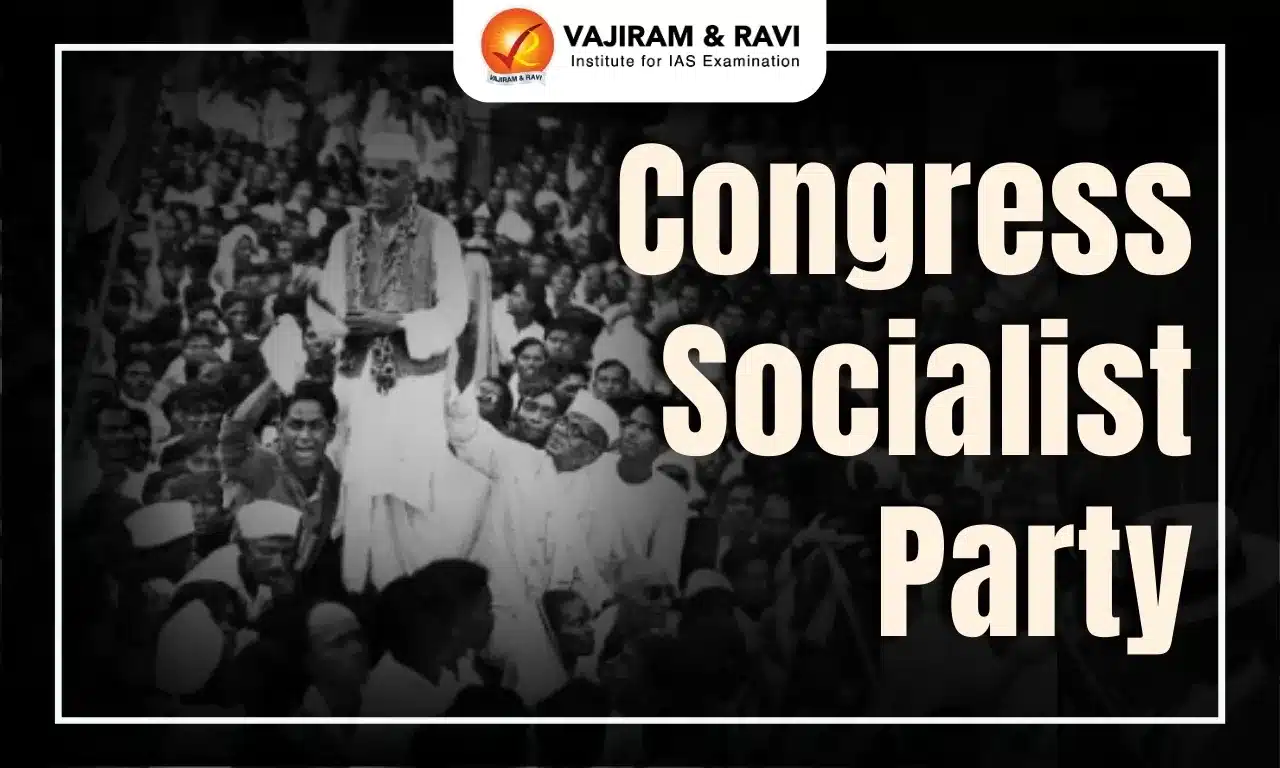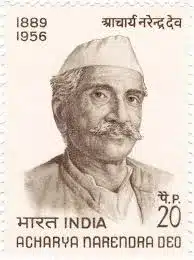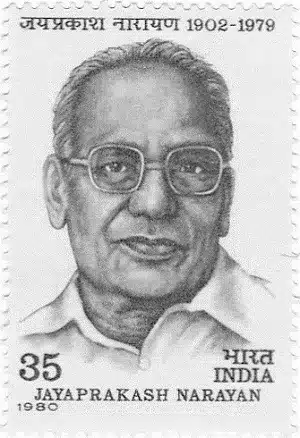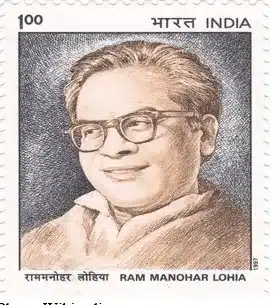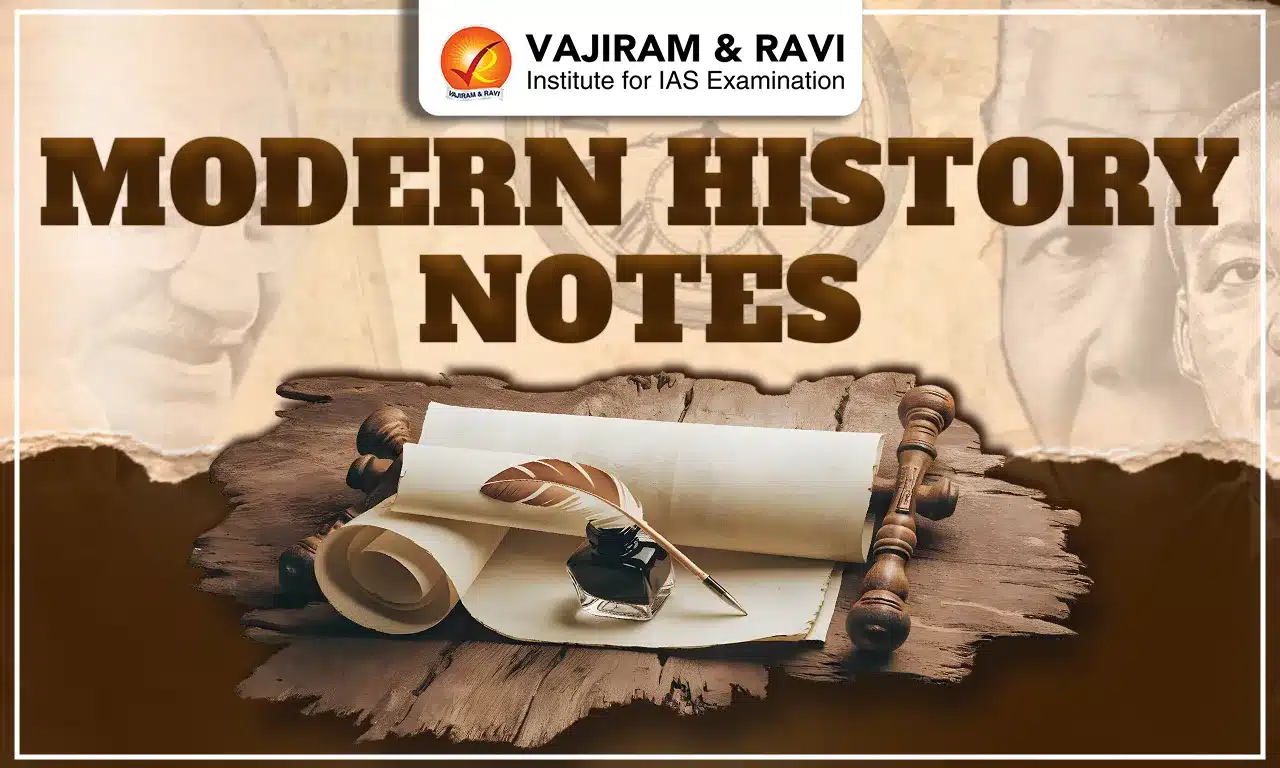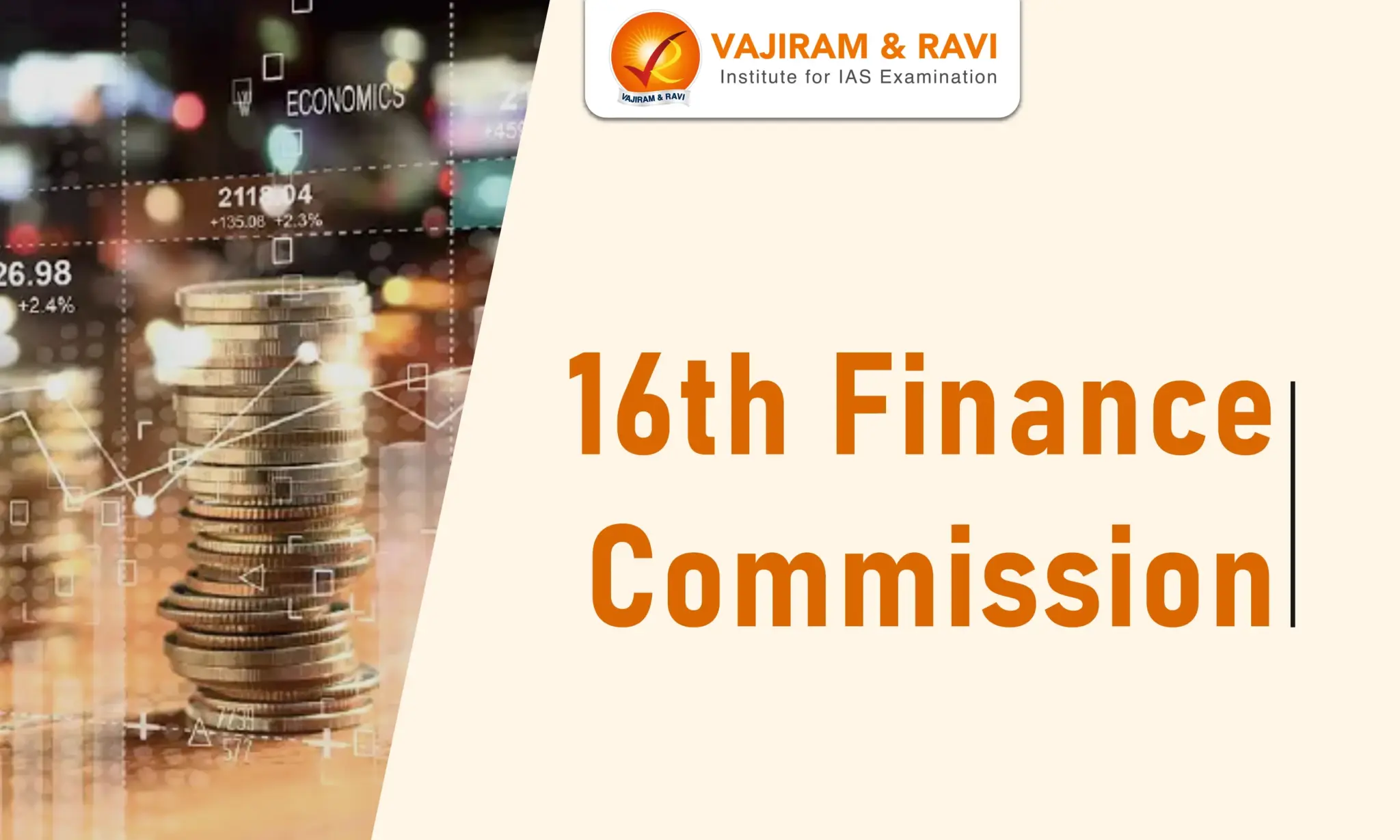Congress Socialist Party was established in 1934 by the efforts of Acharya Narayan Deo, J.P. Narayan, Ram Manohar Lohiya and Yusuf Meherally within the Indian National Congress (INC) to develop a classless society with an equitable distribution of resources. The first Conference of the Congress Socialist Party was convened at Patna, presided over by Acharya Narendra Deo. In the first annual session of the All India Congress Socialist Party, they adopted the party constitution outlining the programme of action.
Congress Socialist Party organised movements for peasants and workers, resulting in the adoption of various programmes for their upliftment by the INC. The Congress Socialist Party also differed from the Communist Party of India in its ideology and political orientation.
Congress Socialist Party Background
Congress Socialist Party (CSP) was established after a preliminary meeting held in Patna in May 1934 by a group of young Indian National Congress (INC) leaders influenced by socialist ideas. Jay Prakash Narayan became the party's organising secretary. After this, the first annual session of the All India Conference took place in Bombay in October 1934, where the party's constitution was adopted.
- After the suspension of the Civil Disobedience Movement, a few socialists within Congress who were inspired by the Marxist ideas formed a socialist faction within Congress.
- The Socialists criticised the INC for favouring capitalists and landlords and ignoring the interests of workers and peasants.
- The Party was made to prevent the degradation of the revolutionary character of Congress by entering into the legislature.
Over time, the Congress Socialist Party underwent multiple divisions and mergers, leading to the formation of various socialist factions such as the Kisan Mazdoor Praja Party, Praja Socialist Party, and Samyukta Socialist Party.
Congress Socialist Party Ideologies
Congress Socialist Party believed in equality, justice, and social welfare. They condemned Capitalism and the concentration of wealth in the hands of a few. Congress Socialist Party wanted the wealth to be distributed equitably. They also supported the idea of land redistribution. They aimed to create a classless society with equal access to resources and opportunities for everyone. Some of the other ideologies of the party include:
- They aimed to socialise key industries, such as cotton, steel, jute, railways, shipping, insurance, and public utilities, for progressive control of production, distribution, and exchange tools.
- They wanted the liquidation of debts owed by peasants and workers.
- They wanted the State to recognise the right to work.
- They insisted on ending landlordism, supporting cooperative farming, reducing land revenue, and eliminating feudal levies for peasants.
- Advocating for freedom of trade unions, the right to strike, and better working conditions for workers, including insurance against unemployment, sickness, and accidents.
- Like the INC, the Congress Socialist Party aimed for independence from British rule but also sought to establish a socialist state post-independence.
Congress Socialist Party Leaders
Congress Socialist Party was led by many notable leaders like Acharya Narendra Deo, the founding President, Loknayak Jaypraksh Narayan, Ram Manohar Lohia, Yusuf Meherally, Achyut Patwardhan, Ashok Mehta, and M.R. Masani. These leaders were active participants in the Civil Disobedience Movement of 1930. All of them were imprisoned in Nasik Jail. After their release, they formed the left wing of the Indian National Congress, with Acharya Narendra Deo as the president.
- Acharya Narendra Deo: He was the founding President of the Congress Socialist Party. He was imprisoned multiple times during the freedom movement and participated in the peasants' movement. Post-independence, he headed the Socialist Party and later the Praja Socialist Party.
- Lokanayak Jayprakash Narayan: He was also the founding member of the Congress Socialist Party and the party's general secretary. He strongly advocated the need for socialist policies in India’s freedom struggle. He led the underground resistance during the Quit India Movement.
- He also played a vital role in the Bhoodan Movement and the Naga rebels, and opposed the National Emergency of 1975.
- Ram Manohar Lohiya: He was a freedom fighter, socialist leader, and one of the founding members of Congress's Socialist Party. After the split of the Congress Socialist Party, he became the leader of the Samyukta Socialist Party.
- Yusuf Meherally: He drew inspiration from the works of Mazzini and Garibaldi, the Sinn Fein Movement in Ireland and the Chinese and Russian Revolutions. In 1928, he founded the Bombay Youth League, actively demonstrating a protest against the Simon Commission.
- Achyut Patwardhan: He drew inspiration from the principles of Gandhian thought and Theosophical beliefs. He was jailed for participating in the Civil Disobedience Movement of 1930. In 1947, he founded the Socialist Party of India.
- Ashok Mehta: He played a key role in organising the Congress Socialist Party and later joined the Indian National Congress in 1964 after being expelled from the Paraja Socialist Party. He also served as the editor of the Congress Socialist Party's journal, Congress Socialist, for several years.
- M.R. Masani: In collaboration with Jayprakash Narayan, he founded the Congress Socialist Party. Fabian Socialism, the British labour movement, and the Bolshevik Revolutions in Russia shaped his thoughts. He was one of the founding members of the Indian Liberal Group, a think tank that advocated for classical liberalism.
Congress Socialist Party Impact on National Politics
The Congress Socialist Party faced varied responses from within the Indian National Congress. While right-wing Congress members disapproved of the CSP's stance on property confiscation and class struggle, leaders like Jawaharlal Nehru and Subhas Chandra Bose supported the party’s formation, though they did not officially join.
- Mahatma Gandhi was dismissive of the CSP's idea of class struggle, as his focus was on transforming the mindset of princes, landlords, and industrialists to fulfill their roles as caretakers of their employees and tenants.
- Jawaharlal Nehru supported the idea of socialism and proposed revolutionary changes in India's political and social structure, including the abolition of private property and replacing the profit system with cooperative service.
The Congress Socialists also played an instrumental role in the Kisan Movement, organizing the All-India Kisan Sabha, and advocating for the abolition of zamindari, reduction in land taxes, and affiliation with the Indian National Congress.
Difference Between Congress Socialist Party and Communist Party of India
The socialist principles inspired the Congress Socialist Party and the Communist Party of India. The socialists within the Congress adhered to the Marxist ideology similar to that of the Communists. The Congress Socialist Party was part of the INC, whereas the Communist Party of India was an independent party that sometimes opposed Congress. The differences between the two parties can be summarised in the table below:
|
Aspects |
Communist Party of India |
Congress Socialist Party |
|
Year of Formation |
1925 |
1934 |
|
Political Ideology |
Marxism and Leninism |
Gandhian Socialism |
|
Position on Non-Violence |
Supported armed struggle during the freedom movement |
Followed non-violent principles. |
|
Orientation |
Communists believed in the goal of the International Communist Society |
Congress Socialists were Nationalists. |
|
Influence on Indian Politics |
It remained a major political party after independence, especially in Kerala and West Bengal. |
It was significant pre-independence, but post-independence, it declined. |
Congress Socialist Party PYQ
Q1: With reference to the Congress Socialist Party, consider the following statements: (UPSC Prelims 2015)
- It advocated the boycott of British goods and evasion of taxes.
- It wanted to establish the dictatorship of the proletariat.
- It advocated a separate electorate for minorities and oppressed classes.
Which of the statements given above is/are correct?
- 1 and 2 only
- 3 only
- 1,2 and 3
- None
Ans: (d)
Last updated on February, 2026
→ UPSC Notification 2026 is now out on the official website at upsconline.nic.in.
→ UPSC IFoS Notification 2026 is now out on the official website at upsconline.nic.in.
→ UPSC Calendar 2026 has been released.
→ Check out the latest UPSC Syllabus 2026 here.
→ Join Vajiram & Ravi’s Interview Guidance Programme for expert help to crack your final UPSC stage.
→ UPSC Mains Result 2025 is now out.
→ UPSC Prelims 2026 will be conducted on 24th May, 2026 & UPSC Mains 2026 will be conducted on 21st August 2026.
→ The UPSC Selection Process is of 3 stages-Prelims, Mains and Interview.
→ Prepare effectively with Vajiram & Ravi’s UPSC Prelims Test Series 2026 featuring full-length mock tests, detailed solutions, and performance analysis.
→ Enroll in Vajiram & Ravi’s UPSC Mains Test Series 2026 for structured answer writing practice, expert evaluation, and exam-oriented feedback.
→ Join Vajiram & Ravi’s Best UPSC Mentorship Program for personalized guidance, strategy planning, and one-to-one support from experienced mentors.
→ UPSC Result 2024 is released with latest UPSC Marksheet 2024. Check Now!
→ UPSC Toppers List 2024 is released now. Shakti Dubey is UPSC AIR 1 2024 Topper.
→ Also check Best UPSC Coaching in India
Congress Socialist Party FAQs
Q1. What is the Socialist Party of India?+
Q2. Who were the socialist members of Congress?+
Q3. When was the Congress Socialist Party formed?+
Q4. What was the role of the Congress Socialist Party in the Kisan movement?+
Tags: congress socialist party quest upsc modern history notes



